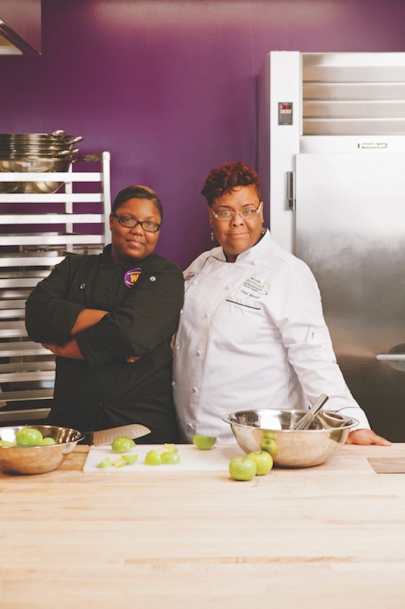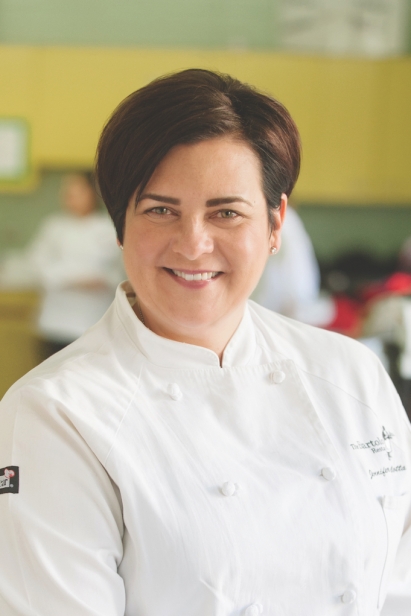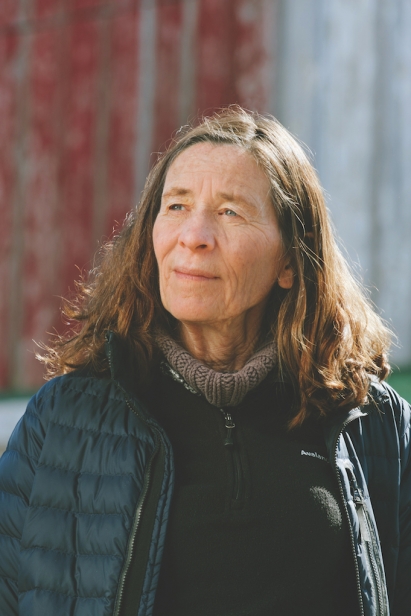Back to Class
It’s supper time on a Tuesday night in a little house near 33rd and Garfield. Angelisa is preparing her family’s favorite meal; Italian Chicken Sandwiches. She dredges fresh chicken breasts in eggs and Italian seasoned bread crumbs, then pan-fries them and serves them on a roll with a homemade spicy tomato sauce.
She prepares this meal for a family of seven; two adults and five children. It’s fast becoming a weekly tradition. Tuesday night, it’s her kitchen. And what’s on the menu depends on what she wants to cook. Angelisa is 17 years old.
Two years ago, she had never even seen fresh basil. She certainly couldn’t picture herself breaking down whole chickens, building sauces or grilling raw asparagus. Not only would she learn these skills— among others — she would soon find herself “rolling dumpling after dumpling” in one of the hottest new restaurants in Milwaukee.
While she was surprising herself, she also caught the eye of her culinary instructor, Sabrina Manuel.
Manuel had been an instructor at Washington High School for years, initially in special education. When administrators found out she had a degree in culinary arts from Waukesha County Technical College, she was moved into a culinary instructor role.
The classroom kitchens at Washington, located on Milwaukee’s near west side on Sherman Boulevard, were a little different when she first began. She had a hodgepodge of cast off equipment—some old, some new. Some of it worked. Some of it didn’t. The biggest problem was that there wasn’t enough of it to give each student the same learning experience.
That was all about to change.
In what Jennifer Bartolotta describes as “the universe conspiring in the most beautiful way,” previously unrelated people, organizations and efforts aligned to bring serious cooking and community to the classrooms of several Milwaukee Public Schools (MPS) locations.
Using the National Restaurant Association Educational Foundation ProStart curriculum, Bartolotta, with the full support of MPS Superintendent Dr. Darienne Driver, embarked on an effort to bring a unique experience to Milwaukee high schoolers who previously might’ve only seen professional cooking on the Food Network.
As a new culinary instructor, Manuel could have felt threatened or over-shadowed by the presence of a high-powered restaurant group into her classroom, but nothing could’ve been further from the truth. Manuel welcomed them with open arms. She knew that it would be an amazing opportunity for her students.
Bartolotta, director of special projects for The Bartolotta Restaurants, describes herself as the facilitator of a workforce development program aimed at bringing—not just food—but food careers, food education and perhaps most importantly, food love to students at MPS.
“I am not the program. I am the glue,” she said.
She calls herself the convener, collaborator and connector. She is quick to defer credit for the program to all the other contributors. But, ask any one of those other contributors and they will say “Jennifer Bartolotta is the program.” At least, she’s the person who made it happen.
With killer food service instinct in her genes, Bartolotta intuitively knew that you can’t teach 35 kids how to cook with five knives and five cutting boards. If they were going to really learn how to cook, they would need the tools.
Bartolotta worked with Boelter Companies, a local food service equipment and supply company, to design, install and outfit a real classroom kitchen. The kind of set up that would make any home economics teacher swoon.
The pilot program was launched in January of 2016 in four Milwaukee schools; Bay View, Vincent and Washington high schools and James Madison Academic Campus. In its first year, 300 students participated in the program. By year two, that number jumped to 480.
Bartolotta didn’t just bring the equipment and the curriculum; she brought chefs. Good ones. The Pabst Theater’s Kevin Sloan and James Beard Awards semi-finalist Dan Jacobs of DanDan and EsterEv to name a few have been consistent contributors to the program.
When he was first asked to participate, Jacobs wasn’t sure what to expect.
“I thought I was going to be like Robin Williams in “Dead Poet’s Society” — ‘Oh captain, my captain’” he joked. But he quickly remembered what being a teenager was like. Looking out at a sea of high school juniors, he knew he wouldn’t win them over with personality. He’d have to do it with passion.
Rather than being one among dozens of chefs in the city complaining about how hard it is to find good kitchen help, Jacobs decided that the only thing to do was to become a part of the solution.
“You could really see how much he cared about the food; how much he wanted it to be good,” Angelisa said. “Which made us want it to be good, too.”
It was this mutual respect between Angelisa and Jacobs that led to her spending a summer in the kitchen learning the restaurant ropes at DanDan.
“It was amazing to see what a restaurant was like behind the scenes and to be a part of it,” she said.
The collection of industry pros didn’t stop at instilling a passion for food in the students. They also brought a no-nonsense restaurant work ethic, telling students — “If you’re late, you can’t work.”
Students who showed up after the bell —or not properly attired — were dismissed. Students looking for an easy “A” or a couple of Mickey Mouse credits quickly learned that cooking is serious business.
They weren’t just making some nice food. They were being exposed to what the industry was really like. They had serious equipment and even more serious teachers. The professional tone definitely captured the students’ attention.
But, when asked what the biggest impact was on her students by having the The Bartolotta Restaurants and chefs such as Jacobs working with them every day — and holding them to a high standard, Manuel was definite: “The kids (could) see that the community actually cared about them.”
Learning was not only limited to the classroom. On a sunny morning in May, students piled onto a bus bound for Turtle Creek Farms in Delevan to see where real food comes from. Owner Janet Gamble sees the farm as a living classroom and an opportunity for students to understand food in its rawest form.
“I love seeing them experience a whole new world,” Gamble said. “I think these programs are essential for providing job training and making the connection to the way we grow food and that agriculture can provide a foundation for caring about very relevant issues such as our environment, health, sciences, math, culture and humanity.”
For Dr. Driver, the intentions of the program were always clear.
“This is a workforce development initiative,” she said. And more importantly than culinary skills, what Dr. Driver and others in the program saw as one of the greatest benefits was the development of students’ confidence, organization skills and ability to communicate with adults.
But Is a program so reliant on volunteerism and the good-hearted intentions of very busy and successful people really sustainable? Well-meaning missions sometimes fizzle out once the magazine articles have been written and the news stories have been told.
Manuel said that these local institutions are in it for the long haul and the greater good — not just to get celery in the hands of a few inner-city kids who wouldn’t encounter it otherwise.
They want to “sow enough seed” to build a better future for these kids and for the Milwaukee restaurant industry.
“The chefs are here every day and they’re not going anywhere,” Manuel said. “The message to students has been ‘We’ll give you the skills and then we’re going to hire you.’”
When she was asked about the long-term viability of the program, Bartolotta pointed to the numbers.
“Participation, attendance and cumulative GPA have steadily increased,” she said. As long as the program is growing, there’s no reason to believe it’s going away anytime soon.
Dr. Driver agreed and is very encouraged by the increased participation and looks beyond the cooking skills garnered from the experience to the essential life skills. Ultimately, this is what will make the program sustainable, she said.
“It’s only about commitment. And I’m all in,” Jacobs said.
As for Angelisa, after she graduates on May 22nd she’ll embark on her dream to open a soul food restaurant. But, she said, she’ll miss the program.
“We were like a family.”







